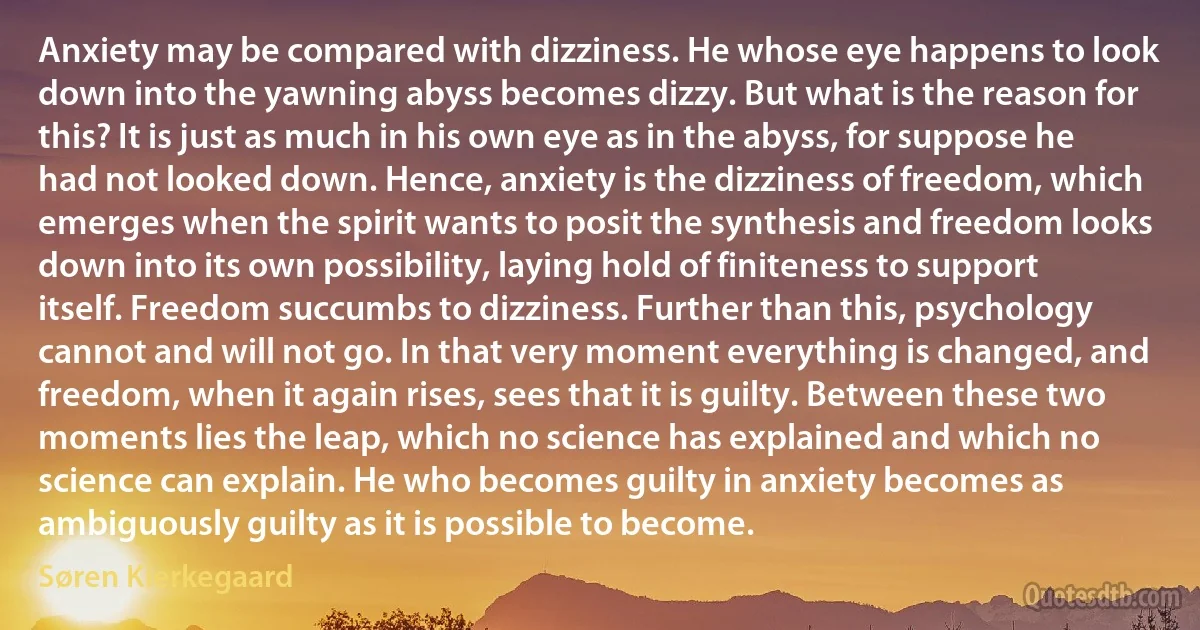
Anxiety may be compared with dizziness. He whose eye happens to look down into the yawning abyss becomes dizzy. But what is the reason for this? It is just as much in his own eye as in the abyss, for suppose he had not looked down. Hence, anxiety is the dizziness of freedom, which emerges when the spirit wants to posit the synthesis and freedom looks down into its own possibility, laying hold of finiteness to support itself. Freedom succumbs to dizziness. Further than this, psychology cannot and will not go. In that very moment everything is changed, and freedom, when it again rises, sees that it is guilty. Between these two moments lies the leap, which no science has explained and which no science can explain. He who becomes guilty in anxiety becomes as ambiguously guilty as it is possible to become.
Soren KierkegaardRelated topics
anxiety dizziness dizzy everything eye finiteness freedom guilty hold leap moment posit possibility possible psychology reason science spirit support suppose synthesis lies looksRelated quotes
The undulation of these infinite numbers of mountains, whose snowy summits make them look as if covered by foam, recalled to my remembrance the surface of a storm-beaten ocean. If I looked towards the west, the ocean lay before me in all its majestic grandeur, a continuation as it were, of these fleecy hilltops. Where the earth ended and the sea began it was impossible for the eye to distinguish.I soon felt that strange and mysterious sensation which is awakened in the mind when looking down from lofty hilltops, and now I was able to do so without any feeling of nervousness, having fortunately hardened myself to that kind of sublime contemplation. I wholly forgot who I was, and where I was. I became intoxicated with a sense of lofty sublimity, without thought of the abysses into which my daring was soon about to plunge me.

Jules Verne
In a field of ripening corn I came to a place which had been trampled down by some ruthless foot; and as I glanced amongst the countless stalks, every one of them alike, standing there so erect and bearing the full weight of the ear, I saw a multitude of different flowers, red and blue and violet. How pretty they looked as they grew there so naturally with their little foliage! But, thought I, they are quite useless; they bear no fruit; they are mere weeds, suffered to remain only because there is no getting rid of them. And yet, but for these flowers, there would be nothing to charm the eye in that wilderness of stalks. They are emblematic of poetry and art, which, in civic life-so severe, but still useful and not without its fruit-play the same part as flowers in the corn.

Arthur Schopenhauer
Neophil: ...Leibniz, Wolff, and their various successors, to what a level of perfection and completeness they have brought philosophy! How proud Germany can be of them! Yet what does it help to claim more for oneself than is right? Let us always acknowledge that someone other than a German, I add further, someone other than a Christian, namely, Spinoza, has participated immensely in the work of bettering philosophy. Before the transition from the Cartesian to the Leibnizian philosophy could occur, it was necessary for someone to take the plunge into the monstrous abyss lying between them. This unhappy lot fell to Spinoza. How his fate is to be pitied! He was a sacrifice for the human intellect, but one that deserves to be decorated with flowers. Without him, philosophy would never have been able to extend its borders so far.

Baruch Spinoza
Consent in virtue knit your hearts so fast,
That still the knot, in spite of death, does last;
For as your tears, and sorrow-wounded soul,
Prove well that on your part this bond is whole,
So all we know of what they do above,
Is that they happy are, and that they love.
Let dark oblivion, and the hollow grave,
Content themselves our frailer thoughts to have;
Well-chosen love is never taught to die,
But with our nobler part invades the sky.
Then grieve no more that one so heavenly shaped
The crooked hand of trembling age escaped;
Rather, since we beheld her not decay,
But that she vanish'd so entire away,
Her wondrous beauty, and her goodness, merit
We should suppose that some propitious spirit
In that celestial form frequented here,
And is not dead, but ceases to appear.

Edmund Waller
There is another objection to the Suffern's or Pompton position, which is, the advantage it gives the enemy of dividing our attention, by taking post at King's Ferry. It will be impossible for us to deter mine which is their object, the camp or West Point; and it will be almost as dangerous to expose our camp as these garrisons, especially early in the spring, when we have all our baggage about us, and no possibility of moving it off. If we take a position near Morris, we can always tell, by the motions of the enemy, what is their object; and, having our camp in a secure situation, should they turn their force to wards this place, we can march to its relief in such force as to give certain support, and at the same time leave our camp in perfect security.

Nathanael Greene
